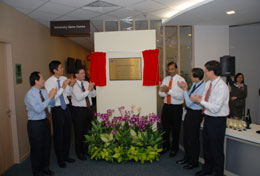The Department of Orthopaedic Surgery started the spine sub-specialty since 1985, with a team of spine specialists dedicated to full-time spine practice in Singapore. The University Spine Centre provides comprehensive tertiary spine care and services with seven full-time spine specialists.

Opening of University Spine Centre on 17 June 2008 by Prof K Satku (then-Director of Medical Services, Ministry of Health Singapore)
The University Spine Centre provides patients a one-stop service platform for quality clinical facilities and a patient-centric, integrated process flow to treat different spinal problems. The University Spine Centre is designed to support this and systematically track clinical outcomes for efficient benchmarking, while providing a safe and personalised outpatient experience. This is in tandem with National University Health System (NUHS)'s strategic goals to provide expanded clinical facilities and promote the collation of clinical outcomes to add value to patients.
With regular courses conducted every year, our centre is also a recognised regional centre for the training of thoracoscopic spinal surgery and spinal deformity surgery, cervical spine surgery, vertebroplasty, as well as artificial disc replacement.
The bulk of surgical procedures done by the University Spine Centre is split into degenerative conditions of the cervical (neck) and lumbar (back) spine, paediatric (child) and adult spinal deformities or scoliosis, spinal trauma, spinal infections, and spinal tumours.
In coordination with the National Scoliosis Screening Programme, the centre regularly performs thoracoscopic (minimally invasive) scoliosis operations, in addition to conventional scoliosis surgeries. In keeping with the latest trends in treatment, we have also been performing artificial disc replacement of the lumbar spine and cervical spine since 2002 and 2005 respectively. In addition, we also perform minimally invasive spine surgeries (e.g. endoscopic discectomy and minimally invasive lumbar fusion) and dynamic stabilisation (non-fusion) surgeries on a routine basis.
In spinal surgery, it is essential to maximise treatment outcomes after surgery. Anaesthetists, rehabilitation physicians, paediatricians, medical and radiation oncologists, orthopaedic surgical nurse practitioners, neurophysiologists (for spinal cord monitoring), physiotherapists, occupational therapists, speech therapists, as well as social workers are regularly involved in the overall care of the patients.
Besides spinal surgery, the division also manages many spinal conditions by non-surgical means, in collaboration with the physiotherapists, acupuncturists, and pain management physicians. The division also regularly performs minimally invasive injection procedures (e.g. vertebroplasty and nerve root injections) for patients who have failed non-surgical treatment but are not suitable candidates for open spinal surgery.